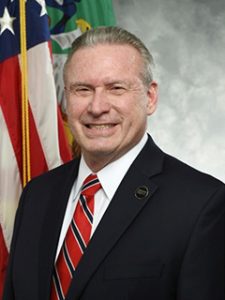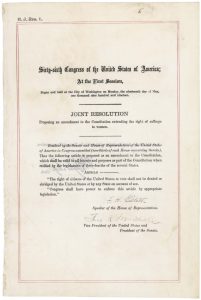Scammed on line? Facebook got paid and they don’t care!
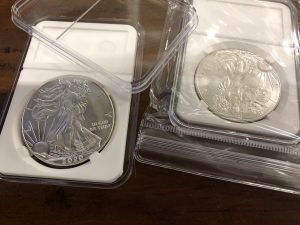
Two counterfeit American Silver Eagles purchased from LIACOO, a company based in China who advertised on Facebook.
Over the last few weeks, I have been counseling several people about requesting a chargeback for receiving counterfeit merchandise. Requesting chargebacks have their problems, too. Some credit card issuers will use the chargeback as an excuse not to renew your credit card.
During this time, another group has been trying to work with Facebook to stop the scammers from reaching consumers.
On Monday, three numismatic groups sent a letter to Facebook Founder Mark Zuckerberg asking why he did not respond to a similar letter a month ago. The letter was signed by Doug Davis, Director of the Anti-Counterfeiting Educational Foundation, Mark Salzberger, Chairman of Numismatic Guaranty Company, and Bob Brueggeman, Executive Director of the Professional Numismatists Guild. You can read the press release and letter here.
It is not surprising that Facebook and Zuckerberg have not answered previous letters. If you watch other media reports about Facebook, the company is notorious for trying to sweep issues under the proverbial rug until something brings it to the forefront. While Facebook claims they are responsive to the communities, they respond solely when someone yells and causes an uproar.
Although some find Facebook useful, it is a cesspool of scammers and trolls playing on the gullible looking to prove P.T. Barnum correct: There’s a sucker born every minute.
News organizations worldwide have reported how criminals use Facebook advertising for crimes, including selling counterfeit merchandise, false activism (e.g., Fake News), and human trafficking.
Facebook’s response has been the same. They promise to try harder and look to add code to help protect their users. The result is that they try to implement a technical solution that works to the point of being able to placated the current activists. The problem is that while Facebook depends on artificial intelligence to protect its platform, company leadership has not shown any real intelligence to understand that there may not be a technical solution to every problem.
It is easier for Facebook to scan for words that someone believes are hurtful than to look at an advertisement selling a one-ounce silver coin for less than its silver value. Besides, the alleged bully is not paying for to have their content distributed to a target audience that includes you.
Facebook really doesn’t care because they are getting paid. They were being paid as late as 2018 by a Russian troll bot for placing activist ads after being admonished for accepting campaign ads paid in Russian rubles in 2016.
Zuckerberg and company do not care. He is getting paid and so is their management. They lie just enough to get past alleged watchdogs in a way to keep confidence in their market price. After all, Facebook stock (NASDAQ: FB) is up 32.25% for the year as of Sep 20, 2021. Why should they care what you think about their advertisers? In the meantime, consumers are getting defrauded by scammers allowed to roam freely by a company that advertises on television as being a place to build a community.
Do not expect help from the government. In between their partisan fighting, members of Congress do not have the knowledge or competence to figure out how to fix the issue. Most members of Congress are lawyers with no technical background nor did any study the technical issues enough to make competent decisions.
Although Congress is to blame, the voters must accept their part of the responsibility. Instead of voting in competent people, they send these old folks with no technical background back to Washington. Many have held their seats for over 20 years without any incentive for advancement. So they grow old without learning new ways and blame everyone else for what they are not doing. Think of the problem like this: 26 of the 100 Senators are 70 years of age or older. None of these people had any experience with computers as students or early in their careers. Most can barely use a smartphone (Steve King actually asked Google CEO Sundar Pichai why his daughter’s iPhone behaved strangely). Even if they did, when was the last time you saw an elderly member of congress with a computer or even a smartphone?
Davis, Salzberg, and Brueggeman will have an uphill battle with Facebook. Everyone does. But the ACEF and PNG need to think beyond talking reason to Zuckerberg. They need to work with Congress to help them understand the technologies and what regulations will be effective without putting undue limits on the technology companies.
I know of one person in the numismatic industry that has a background in technology and public policy. This person worked as a contractor to the federal government for 25 years as an information security analyst. This person worked for a PAC concerned with numismatic issues and has a Masters’ with a concentration in information security and technology public policy from Carnegie Mellon University. You can contact this person at coinsblog.ws/contact.
19th Century Women in Numismatics
As part of the Bureau of Engraving and Printing’s celebration of Women’s History Month, they posted the following image on Facebook (copied here for those who do not use Facebook):

More than 150 years ago, four-subject sheets of Demand Notes, printed by a private firm, were delivered to the Treasury Department where they were individually signed by clerks, and trimmed and separated with scissors by women.
I thought it was a cool picture and wanted to make sure it is shared in the community!
David J. Ryder Confirmed!
As the Senate was processing the nominations on the Senate Executive Calendar, Ryder’s name rose to the top of the list. When the clerk read the nomination and asked for commentary from the floor, the only statement was from Cory Booker (D-NJ). It is customary that a senator from the nominee’s home state to say something in support the nominee. Since there was no objection from the floor, the Senate moved to suspend the rules and pass the nomination by voice vote.
Previously, Sen. Chuck Grassley (R-IA) threatened to block the nomination because he felt that the Department of the Treasury did not respond to inquiries to his satisfaction. When it came time to follow through with the threat, Grassley was not even in the Senate chamber during the vote.
There was no comment offered by Grassley’s office.
After 2,629 days or 7 years, 2 months, and 13 days, our long nightmare is over. The U.S. Mint now has a permanent director!
Good luck Director Ryder.
PN1355: David J. Ryder — Department of the Treasury
The U.S. Mint Disappoints Congress
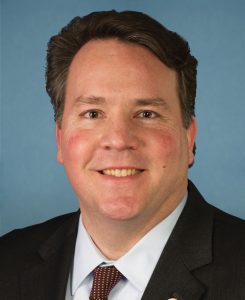
Today’s “Dummy of the Day Award” goes to Rep. Alex Mooney (R-WV) (Official House of Representatives Photo)
In October, Mooney and Rep. Frank Lucas (R-OK) sent a letter to the U.S. Mint asking about what is being done to protect the integrity of U.S. coinage from counterfeiting. The letter contained a gold-plated tungsten American Gold Eagle coin. It was sent after the testimony of David Ryder during his confirmation hearing.
The letter was addressed to Acting Deputy Director David Moti (sic) and Randolph D. Alles, Director of the U.S. Secret Service.
The letter sent by Mooney and Lucas was sent to the U.S. Mint that was run by its fourth non-appointed, interim director since the resignation of Edmund Moy in January 2011. While the interim directors have the same power as political appointees, it is customary that the interim directors maintain the status quo until the Senate approves the president’s nomination.
The U.S. Mint’s response was written under the signatory of Acting Deputy Director David Motl. Motl, Motl’s response to the representative’s inquiry read exactly what can be expected from an interim appointee warming the seat. Basically, the letter said that the U.S. Mint is doing its job as defined by the law and the Acting Deputy Director is working to keep the agency going until a regular director can be approved.
Of course, these representatives did not like this response. They want the U.S. Mint to do something and even gave suggestions. There are two problems with the response that reads like an advertisement for a commercial service. First, if these representatives understood the division of responsibilities, the agency responsible for protecting the integrity of the money supply is the United State Secret Service. The U.S. Mint is the manufacturer of the money, the U.S. Secret Service is the police force that is responsible for protecting the money. One would think that members of Congress who have access to staff and a full-time research department would understand the roles of the various agencies.
Secondly, what would they want an acting director to do? If the acting director is there to make sure the bureau functions until a new director is appointed, then figure out why the U.S. Mint does not have a permanent director? If Mooney does not like the answer then why not take a walk to the other side of the capital and ask Sen. Chuck Grassley (R-IA) why he is throwing a hissy fit and holding up the nomination of a qualified candidate that could legally answer the questions.
Instead, Mooney would rather complain and pound his proverbial chest to make it look like he is doing something whereas to anyone who really looks at the situation sees him as foolish.To add to the fun, the U.S. Mint has a new Acting Deputy Director. Because there is a limited amount of time that a government employee can serve in an “acting” role for an appointed position, David M. Croft has been appointed to the posting as of February 1, 2018. Prior to his appointment as Acting Deputy Director, Croft was the Mint’s Associate Director of Manufacturing. Croft becomes the fifth non-appointed “acting” director since Moy’s resignation.
If there are members of Congress that are not happy with the way the U.S. Mint is being run, they need to work out the problems which they are responsible. Mooney and Lucas should take the U.S. Mint leadership issue up with Grassley. Otherwise, they are doing nothing more than spitting into the wind.
Weekly World Numismatic Newsletter for March 18, 2018
When news comes out of the United Kingdom it is fun to read how the British tabloids write about them. They have a way with their words that make no doubt about where they stand.
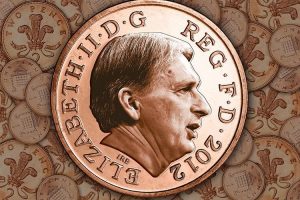
Philip Hammond has branded a ‘penny-pincher’ after revealing shock plans to scrap 1p and 2p coins (Courtesy of The Sun)
Chancellor of the Exchequer is to the United Kingdom as the Secretary of the Treasury is to the United States.
During Hammond’s review of the treasury, he said that since 500 million 1p and 2p coins fall out of circulation every year that it might be a good idea to eliminate them.
Hammond is a member of the Conservative Party. Following his statements on the State of the Treasury, MP (Member of Parliament) Wes Streeting, a member of the Labour Party, referred to Hammond as “this penny pincher Chancellor.”
That opened the tabloids and other opposition parties to attack Hammond and the Tories. Much like the argument against eliminating the one-cent coin in the United States, those against removing those coins worry about squeezing the poor a few pennies at a time (allegedly) making their situation worse.
For the £50 note, Hammond cites studies about its use in organized crime for physical payments. However, studies show that the criminals are more apt to use the 500€ note, while it is still in circulation, the 100&euro note, and the $100 Federal Reserve Note. Even with the strong exchange rate being strong on the pound sterling, it is more advantageous for criminals to use higher denomination banknotes.
Prime Minister Theresa May, who has the final say, gave the British press a non-committal statement following the opposition attack. Of course, that opened her up to being called whishy-washy by the tabloids.
The British tabloids do make the news entertaining!
And not the news…
Whether a modern quarter displaying a U.S. national park or a rare, hand-hammered Greek denarius dating back to 250 A.D., history is woven throughout the process and story of all coins, tokens and currencies, according to Monte Mensing, president of the Springfield Coin Club.  → Read more at registerguard.com
→ Read more at registerguard.com
GAYLORD — When Kandus Schalter received a “challenge coin” from Matt Barresi, director of the Gaylord Regional Airport, she thought she might just keep it in her wallet. But Frank Jasinski thought Schalter, a World War II veteran and local businesswoman with strong ties to the community, should be able to wear it proudly, so he offered to take it to Hogan’s Jewelers, to put a hole and catch in it.  → Read more at petoskeynews.com
→ Read more at petoskeynews.com
On Monday, March 12, the National Bank of Ukraine introduces a commemorative coin "The Day of the Ukrainian Volunteer". This was reported by the press service of the bank. The nominal value of the coin is 10 UAH, metal is a zinc-based alloy, the circulation is 1 million pieces.  → Read more at 112.international
→ Read more at 112.international
The Treasury could be paving the way for the end of 1p and 2p coins as it seeks views on the future of cash. It is inviting comments on the mix of coins in circulation as consumers move to non-cash payments such as contactless and digital spending.  → Read more at bbc.com
→ Read more at bbc.com
PHILIP Hammond was branded a “penny-pincher” after revealing shock plans to scrap 1p and 2p coins. Unveiling his Spring Statement, the Chancellor resurrected proposals to abolish the “obsolete” copper change.  → Read more at thesun.co.uk
→ Read more at thesun.co.uk
The National Bank of Ukraine (NBU) has decided to stop striking coins of low denominations — 1 kopiyka, 2 kopiykas, 5 kopiykas, 25 kopiykas coins, acting NBU Governor Yakiv Smolii has said. “The National Bank stops striking 1 kopiyka, 2 kopiykas, 5 kopiykas, 25 kopiykas coins. All these denominations of coins will be in circulation, but in the …  → Read more at kyivpost.com
→ Read more at kyivpost.com
A pot of 500 gold and silver coins dating to the 15th century was discovered in the Netherlands.  → Read more at livescience.com
→ Read more at livescience.com
The five dollar gold coin is the first time the Mint has ever issued currency in a pink hue.  → Read more at usatoday.com
→ Read more at usatoday.com
Utility workers in the Netherlands struck gold while laying drain pipe at a construction site earlier this month. The employees of Oasen, a water supply company, unearthed a collection of nearly 500 coins in a glazed cooking pot dating back to the 15th century, the NL Times reported — 12 of them gold and the remaining silver.  → Read more at nydailynews.com
→ Read more at nydailynews.com
Yet another quarter series?
The excitement wore off when I saw the bill that was introduced.
Rep. Barbara Lee (D-CA) introduced H.R. 5308 with the initial title of To amend title 31, United States Code, to require the Secretary of the Treasury to mint and issue quarter dollars in commemoration of the Nineteenth Amendment, and for other purposes.
The text of the bill is not available, yet.
The Nineteenth Amendment granted women the right to vote. It was the culmination of the women’s suffrage movement. To amend the constitution, it passed the House of Representatives on May 21, 1919, the Senate on June 4, 1919, then by 36 of the 48 states on August 18, 1920.
How do you create a design to commemorate the Nineteenth Amendment? Will there be one quarter per state? If so, what would be on Maryland’s quarter? Maryland rejected the amendment in 1920, the legislature ratified it in 1941, but the vote was not certified until 1958.
Then there is Mississippi that rejected the amendment in 1920 but passed it in 1984 becoming the 48th and last state to ratify the amendment (Alaska and Hawaii were not admitted to the union at the time and are ineligible to vote on the amendment).
While it is appropriate to celebrate the 100th anniversary of Women’s Suffrage, maybe it should be a commemorative coin with the proceeds going to an organization like the League of Women Voters.

